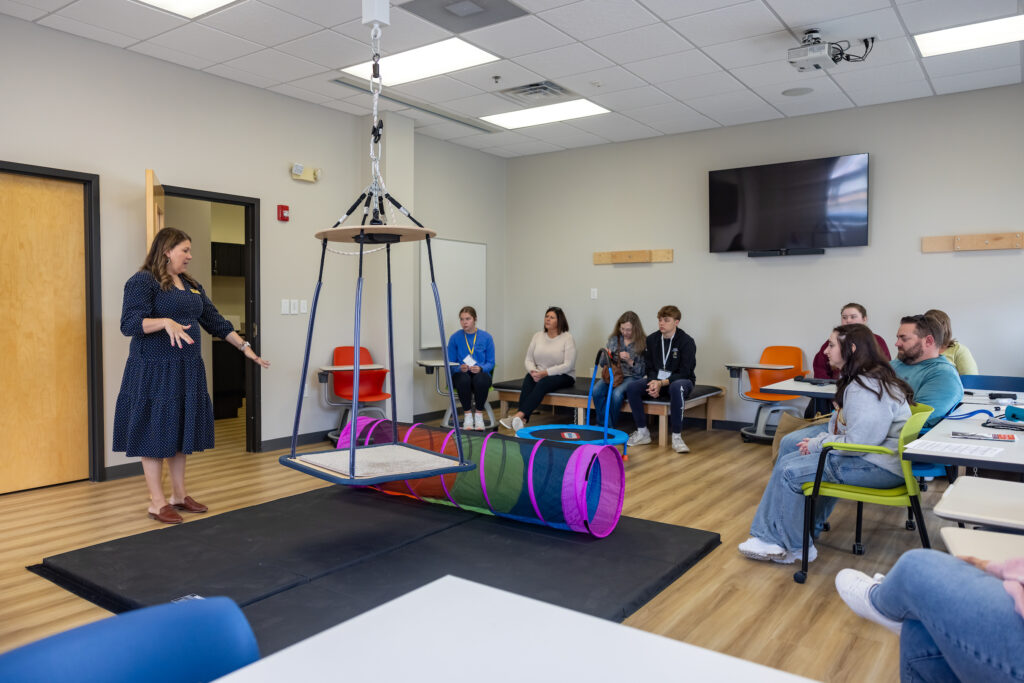For licensed occupational therapists, choosing the right doctor of occupational therapy (DrOT) program can make all the difference. Not only does a well-rounded program prepare students for the ever-evolving landscape of healthcare, but it also provides occupational therapy professionals with the practical skills necessary to make a real impact. Valparaiso University’s DrOT program offers a curriculum that stands out for its holistic approach, blending theory with real-world application in a way that many other programs do not.
In this article, we’ll break down Valpo’s DrOT curriculum, course by course, and explore how each contributes to preparing students for the challenges and opportunities of modern occupational therapy practice. We’ll also examine why this curriculum offers a more comprehensive and practical preparation than many traditional programs, ensuring that graduates are ready for real-world demands, not just theoretical concepts.
Valpo’s DrOT Curriculum Overview
The curriculum at Valparaiso University is designed to prepare students for advanced occupational therapy practice, leadership roles, and academic positions. It is structured around a combination of theoretical knowledge, research methods, leadership training, professional development, and hands-on capstone projects. Below, we’ll look at each course in detail to understand how it contributes to the development of a well-rounded, future-focused occupational therapist.
OCTH 750: Occupational Therapy Theories, Models, and Framework (6 credits)
The foundation of any advanced occupational therapy program lies in understanding the theories, models, and frameworks that drive the practice. OCTH 750 provides students with the philosophical underpinnings of occupational therapy and occupational science, equipping them to critically engage with different theories and models that describe human occupation.
By studying theoretical constructs, students gain the ability to analyze clinical situations from multiple perspectives. This enables them to support or refute clinical actions based on well-established models and treatment interventions, giving them the critical thinking skills necessary for advanced clinical practice. In practice, this means Valpo graduates are equipped not just with book knowledge but with the ability to apply these models in real-world situations, ultimately improving patient outcomes.
While many programs offer theory-based courses, Valpo’s focus on blending individual, group, and societal demands makes it more comprehensive. Students don’t just learn theories in isolation; they examine how these theories intersect with larger social and group dynamics, preparing them to work effectively in diverse settings.
OCTH 755: Research Methodologies (6 credits)
One of the pillars of modern occupational therapy is evidence-based practice, and OCTH 755 equips students with the research skills they need to contribute to the field. This course covers qualitative, quantitative, and mixed-method research methodologies, giving students a robust toolkit for conducting research that can influence clinical practice and manual therapy.
Students learn to design studies, develop data collection tools, and analyze research findings, all while gaining experience in preparing Institutional Review Board (IRB) proposals. These are crucial skills for occupational therapists who wish to contribute to research or take on academic roles. Additionally, by mastering evidence appraisal, Valpo students become adept at integrating cutting-edge research into their daily practice, ensuring that their interventions are based on the latest scientific evidence.
Rather than focusing solely on theoretical research concepts, Valpo emphasizes practical application. Students learn how to craft research that can directly impact their practice, ensuring they are not just consumers of evidence but also contributors to the body of knowledge in occupational therapy. This practical focus ensures that graduates are ready for research roles that influence real-world clinical practice.
OCTH 760: Educational Principles in Occupational Therapy (3 credits)
A unique feature of the Valpo DrOT curriculum is its focus on education, both in academic and clinical settings. OCTH 760 teaches students how to design and develop a curriculum, using educational principles to enhance their ability to educate clients, peers, or future occupational therapists.
Whether you are aiming for a career in clinical practice, research, or academia, education is a critical skill. Occupational therapists often find themselves in roles where they need to educate patients, their families, or even fellow healthcare professionals. This course prepares Valpo students to be effective educators by introducing them to a variety of pedagogical strategies. Graduates are thus prepared to lead educational initiatives in diverse settings, from patient education workshops to formal academic instruction.
Most DrOT programs offer some exposure to teaching principles, but Valpo’s approach is more integrated. By focusing on both curriculum design and the broader context of educational strategies, Valpo prepares its students to become leaders in educational innovation within occupational therapy, ensuring that they can translate knowledge effectively to multiple audiences.
OCTH 765: Leadership in Healthcare (3 credits)
Leadership is an essential quality for any healthcare professional looking to make an impact. OCTH 765 equips students with the leadership skills they need to lead teams, manage programs, and influence the direction of occupational therapy practice within healthcare organizations.
This course covers leadership theories, business planning, case management, and personnel management. Students gain experience in program development and evaluation, as well as outcomes assessment, which are essential for anyone aiming to take on a leadership role in healthcare. By focusing on emotional intelligence and leadership strategy, Valpo graduates leave the program ready to lead with empathy, making them not just effective managers but also compassionate leaders.
Unlike many programs that focus only on business skills, Valpo integrates emotional intelligence and ethical leadership into its curriculum. This ensures that graduates are prepared to lead not only with technical competence but also with a focus on the well-being of their teams and the populations they serve.
OCTH 785: Capstone Discovery and Design (3 credits)
The Capstone Discovery and Design course is where students begin to apply everything they’ve learned to develop a major scholarly project. Guided by a faculty advisor, students explore advanced practice areas and design a project that synthesizes their knowledge with real-world occupational therapy practice.
Students are tasked with designing a project that has real-world relevance, using evidence-based approaches and integrating knowledge translation concepts. Whether the focus is on clinical practice, research, education, or even entrepreneurship, the capstone project helps students apply their learning in a tangible, impactful way.
This course is more than just an academic exercise. Valpo ensures that the capstone project is a meaningful exploration of each student’s professional interests, providing an opportunity to contribute something valuable to the field of occupational therapy. This focus on practical, individualized project design ensures that graduates leave the program with not only a degree but also a body of work that demonstrates their expertise in effective strategies in OT.
OCTH 790: Capstone (6 credits)
The culmination of the DrOT program, OCTH 790, is where students implement their capstone projects and contribute to the advancement of occupational therapy knowledge. By this stage, students have completed their research, designed a project, and are now tasked with implementing it.
Students gain hands-on experience in strategy implementation, outcomes evaluation, and presenting their findings. These are invaluable skills for those looking to advance the occupational therapy field, whether through clinical innovation, research, or education. Graduates are prepared not only to practice but to lead, innovate, and advocate for the future of occupational therapy.
Valpo’s emphasis on real-world application is evident in this final course. By guiding students through the implementation of a meaningful project, the program ensures that graduates leave with the experience of taking a project from concept to execution—preparing them to make real-world contributions to occupational therapy from day one after graduation.
OCTH 770: Advocating for the OT Profession (3 credits)
Advocacy is a vital skill for occupational therapists, especially when working with underserved populations. OCTH 770 equips students with the tools necessary to advocate for better healthcare access and services, particularly for communities that face significant barriers.
In this course, students learn about the importance of cultural competency and how to develop advocacy skills across various levels—individual, population, and societal. Through methods like grant writing, policy analysis, and political activism, students become advocates for social change and better healthcare access. Graduates of Valpo’s DrOT program leave with the skills to not only provide care but also to fight for systemic changes that will allow more people to access that care.
Most programs touch on advocacy, but Valpo makes it a cornerstone of its curriculum by integrating it with cultural competency and practical methods of change-making. This ensures that graduates are prepared to advocate for their profession and their patients, both in clinical settings and within larger policy frameworks. Whether working with older adults, children with autism spectrum disorder, or young professionals needing to improve motor function, this course helps OTs advocate for those they serve.
OCTH 775: Current Trends in Advancing Emerging Practice Areas (3 credits)
The healthcare landscape is constantly evolving making continuing education vital, and occupational therapists must be prepared to identify and act on emerging trends. OCTH 775 equips students with the skills needed to spot new opportunities for occupational therapy services based on trends identified by the American Occupational Therapy Association (AOTA).
Students develop action plans and assess needs for occupational therapy in emerging practice areas. This online continuing education course encourages innovation and forward-thinking, ensuring that graduates are not just reacting to changes in healthcare but actively driving new areas of practice. Whether it’s telehealth, mental health, or community-based interventions, Valpo graduates are prepared to lead occupational therapy into the future.
Valpo’s curriculum doesn’t just teach current practice; it prepares students to anticipate and create future trends. By developing skills in emerging practice areas, students become leaders who can drive the profession forward, ensuring that occupational therapy remains relevant and impactful in a changing world.
OCTH 799: Independent Study
OCTH 799 offers students the opportunity to dive deeper into a specific area of interest through independent study. This course is flexible and tailored to the student’s professional goals, allowing them to explore a topic of choice under the guidance of a faculty advisor.
The flexibility of this course enables students to pursue areas that align with their career aspirations. Whether they want to explore new research areas such as assistive technology, deepen their understanding of a particular OT model, or investigate a new practice area, this independent study allows students to expand their expertise beyond the core curriculum.
The inclusion of an independent study course offers students the autonomy to tailor their education to their professional interests. Valpo recognizes that each student’s career path is unique and offers them the freedom to explore topics that will directly benefit their future practice.
IPE 518: Global Health Issues (3 credits)
Valpo’s DrOT program offers a global perspective through IPE 518, an interprofessional education course that immerses students in global health issues. In this course, students examine social determinants of health from a worldwide perspective and compare healthcare delivery systems from around the globe.
Understanding global health issues is crucial for any healthcare provider, especially in an increasingly interconnected world. This course gives students the tools to analyze global health trends, understand healthcare systems in different countries, and work within international frameworks. The knowledge gained in this course can be applied to addressing health inequities both at home and abroad.
By incorporating global health issues into its curriculum, Valpo ensures that its graduates are not just prepared to work in local contexts but are equipped to contribute to the global healthcare conversation. This broadens their perspective, making them more adaptable and aware of the larger forces at play in healthcare worldwide.
How Valparaiso University’s Curriculum Prepares You for the Real World
Many DrOT programs are rich in theory but fall short in preparing students for the practical realities of occupational therapy practice. Valpo’s curriculum excels by bridging the gap between theory and practice. Here’s why:
- Integration of Theory and Practice: Each course is designed not just to teach theoretical knowledge but to show students how to apply it in real-world settings. This prepares students to think critically about the work they do, ensuring they are not just following protocols but actively improving patient care through thoughtful application of evidence-based practices.
- Emphasis on Leadership and Education: Occupational therapy is as much about leading and educating as it is about direct patient care. Valpo’s focus on leadership and educational principles ensures that graduates are prepared to lead teams, design programs, and educate both clients and fellow professionals.
- Capstone Focused on Real-World Impact: The capstone project is not just an academic requirement; it is an opportunity for students to make a real contribution to the field. Valpo’s emphasis on project design, implementation, and evaluation ensures that graduates leave with practical experience in advancing occupational therapy practice.
- Evidence-Based Research Skills: In an era where healthcare is increasingly driven by data, Valparaiso University ensures that its students are equipped with the research skills necessary to contribute to the evolving body of knowledge in occupational therapy. This is not just about reading research papers but about actively conducting research that can inform and improve clinical practice.
- Holistic Approach to Occupational Therapy Education: Valpo’s curriculum is comprehensive in its scope, covering everything from theory and research to leadership and education. This prepares students to be versatile practitioners who can work in a variety of settings—from hospitals and schools to private practice and academic institutions.
Apply to Valpo’s Post-Professional DrOT Program
Valparaiso University’s post-professional doctor of occupational therapy program is designed to equip students with the courses they need to further contribute to the OT field. With esteemed faculty, a wide range of courses, and online learning flexibility, Valpo’s DrOT is an incredible program for occupational therapists.
To learn more, book a call today with a graduate admission specialist or apply online.
Interested in learning more?
Latest articles
December 11, 2025





